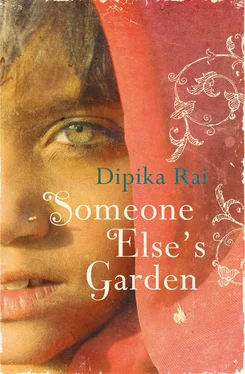He is irritated that his wife has heard already and not from him. He still hasn’t looked at her and seen the wincing pain flicker on and off her face as sudden as a streak of lightning. If she’s heard, he’s not going to talk any more. Let her hear everything at the well.
‘Let’s call her Shanti,’ sticky with fear, the reluctant words drop slowly from her lips. She has to shout the name over the wind. ‘Shanti!’ Shanti is sleeping silently in her corner, though the wind tries its best to draw her out of her unconscious world.
Shanti! She has run out of love words. That’s how she wanted to name all her children, with love words. Mamta, soft-comforting-selfless-melting mother’s love. The kind of love that has staying power. The kind of love needed by her daughter, stained above the eye with a virulent birthmark. She had consulted the pundit and he’d produced the letter M for green Mamta. Jivkant, she’d had a difficult time naming him. There were no love words starting with J, and the priest wouldn’t change the letter even though Lata Bai offered him twenty rupees to do so. So she had to settle for Jivkant, beloved of the world, not a true love word, but close enough. After Jivkant there were no more priests. Prem she named all by herself. Prem, kindly love that outlasts all passion, it is the best love between husband and wife. Then came Ragini, love, attachment, an apsara. A beautiful name for her beautiful daughter who fulfilled every dream she’d dreamt up for her. After Ragini it was Sneha, another girl. Sneha, tenderness, mutual attraction, gentle, warm, flowing, congenial love. Ordinary Sneha, to whom it seems as if the entire beauty quota has been appropriated by her elder sister Ragini. And finally, Mohit. Eight-year-old Mohit, falsely destined to be the last of her children. How could she have named Mohit anything else? Mohit, deep love, the kind that makes you want to cling on forever. The kind that drives you mad.
‘Fix Mamta’s date for next week. We will be ready then,’ she adds, quickly changing the conversation to one that deals with getting rid of a daughter instead of adding one to their household.
He is not beguiled. ‘Not another girl,’ he says.
‘We must accept what God gives us.’
You can’t say that Seeta Ram hates talking about God, but it’s somewhere up there with delayed meals. He looks at his wife. ‘Don’t talk to me about God,’ he says. The hut is pummelled by more wind just as thunder takes over their world, proof that the gods immediately recognise irreverence.
Her children run in giggling and laughing. For them the storm has become a source of fun. Sneha and Mohit will go shower in the rain. No one asks after the baby. A birth of a child is a natural event, like the wind; they will be told the important details – boy or girl – by and by.
‘It’s coming down now,’ Mamta shouts, pulling her wet chunni round her head even tighter. Her new modesty is endearing. She is very conscious of her upcoming wedding, and behaves as if her future husband is already in the room.
‘Don’t you have any work? Your wedding isn’t for another seven days.’ Her father is angry.
‘Mamta, Mohit, go tie down the hay,’ commands Lata Bai. ‘Sneha, watch Shanti.’ The name out of her mouth, the reality of the baby is sealed. They have a little sister. They all know what that means. Another girl. Another burden.
‘Your children, they do no work until they are told.’ He accuses her of producing foul offspring.
This time she drops her eyes . . . You are my husband of over twenty years. I have lived with you more than I have with my own parents. Except two hundred days, we have slept on the same bed every day all these years. Tonight we will sleep apart, and we should remain apart for the next forty days till I am once again pure. But on the twelfth day, you will take me back to your bed. Then you will climb over me that very night. We will pull the cloth over our heads and, healed or not, in pain or not, bleeding or not, you will pour your seed into me.
For forty days at least she won’t have to worry about another baby. But still, she does worry. She hates the nightly sex in full view of the children. Mostly Mamta gets up and goes outside to look at the sky as Seeta Ram goes up and down over Lata Bai. The boys just giggle. Then it’s over. No other man would think of coupling with his wife during the first forty days, but not Seeta Ram. He’ll roll off, leaving blood stains on the hay, and then she’ll put her aching legs together. That’s how it has been. Every time.
A baby and then another. That’s where the life is going to pour out of me when I die. From between my legs and not from my nose like other people.
‘I will be going to see him for myself. These men are tricky, they say one thing and they do another.’
‘Who?’ She’s still with her children, but her husband has returned to the more important matter at hand.
‘Daku Manmohan. He’s only doing it because Lokend Bhai has guaranteed his family’s safety. Why the police don’t just kill him, I’ll never know,’ he says, eating, quietly watched by his children. Mohit joins his father, also sitting cross-legged on the floor. Lata Bai calculates the meals precisely. Today she will publicly give Mamta an extra half chapatti. Seeta Ram will say nothing, but only because she is to be married in a few days and leaving for good. Every other day he would say, ‘Let her eat the leftovers. Why water someone else’s garden?’
‘I have explained their roles to them. You will remember when the time comes, won’t you?’ Lata Bai asks her children from her corner. She will eat with the girls after Seeta Ram has finished.
Seeta Ram refuses to be dragged into marriage talk. ‘Daku Manmohan, surrendering. That’s really something! The government is offering him and his gang limited freedom,’ he says, cautiously prodding a sleeping memory of looting and slaughter. ‘Pah! Limited freedom! We all know what that translates to. A jail cell more comfortable than the best hotel, with hot tea on tap, a game of cards with the guards and food cooked by their wives who will be given pukka brick houses,’ he says, spitting on the floor. ‘That murdering motherfucker, how many has he killed? How many has he maimed?’
‘None from our family. Thank God. And only because Amma’s brother is in the gang,’ says Mamta, giggling. During the harvest, more than twenty years ago, when the farmers scaled down their rations and looked for new places to hide their precious grain, Lata Bai’s brother disappeared. The whole family searched for his dead body, but not her father. No one knows for sure what happened to the boy, but Lata Bai’s father cut and threshed his wheat with impunity that very day, while other farmers left their crops standing to rot in their fields. Blood money. That’s what Lata Bai suspected it was. Blood money. A boy in exchange for protection. A boy who would one day become a man. ‘Imagine, my uncle in the gang.’ Her almost-wed status has made Mamta bold.
‘Mamta!’ Both father and mother censure her in unison. It isn’t a subject to be discussed, as it separates the family from the rest of Gopalpur’s inhabitants.
‘Well, it’s true.’
‘Mamta, leave things that don’t concern you alone,’ says Lata Bai. To this day she feels guilty that her hut wasn’t burned down with the rest.
‘You had better shut her up,’ Seeta Ram adds, slicing his palm through air in a smacking motion.
Shanti starts to cry. Lata Bai lets her cry. It will be a while before she will pick her up. That’s how she’s trained all her daughters into silence. The boys are picked up at once.
Mamta brings the baby to her mother. ‘Tch,’ the mother shakes her head at her eldest, and then she says proudly, ‘See, she’ll make a good mother,’ because as far as Lata Bai is concerned daughters are born to be good mothers first, before anything else.
Читать дальше












